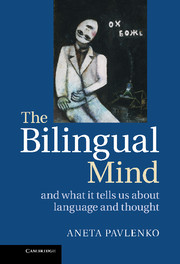Book contents
- Frontmatter
- Contents
- List of Tables
- Acknowledgments
- Preface
- 1 The Sapir-Whorf hypothesis and the bilingual turn in the study of language and cognition
- 2 Material worlds
- 3 Multidimensional worlds
- 4 Dynamic worlds
- 5 Narrative worlds
- 6 Discursive worlds
- 7 Emotional worlds
- 8 The bilingual mind and what it tells us about language and cognition
- References
- Author index
- Subject index
Preface
Published online by Cambridge University Press: 05 June 2014
- Frontmatter
- Contents
- List of Tables
- Acknowledgments
- Preface
- 1 The Sapir-Whorf hypothesis and the bilingual turn in the study of language and cognition
- 2 Material worlds
- 3 Multidimensional worlds
- 4 Dynamic worlds
- 5 Narrative worlds
- 6 Discursive worlds
- 7 Emotional worlds
- 8 The bilingual mind and what it tells us about language and cognition
- References
- Author index
- Subject index
Summary
Preface
Let me begin this book by confessing that its title is a misnomer and a misrepresentation. In reality, there is no such thing as the bilingual mind: bilinguals vary greatly in linguistic repertoires, histories, and abilities, and the bilingual mind appears here as an umbrella term to refer to a variety of speakers, including multilinguals. The modifier bilingual is also a problem because languages are not easily identifiable, discrete, and countable entities. A popular source of information on world languages, Ethnologue, states upfront that the boundaries between them are blurry and that languages are best seen as continua of features that change across time and geographic space. These continua are nevertheless psychologically real to their speakers and we would be remiss if we did not try to understand their functioning in contexts where speakers see themselves as learning another ‘language’ or speaking more than one ‘language’. Respectful of this psychological and social reality, throughout this book, I will unapologetically use the terms ‘language’, ‘bilingualism’, and ‘multilingualism’, all the while recognizing their discursively constructed, approximate, and interpretive nature.
- Type
- Chapter
- Information
- The Bilingual MindAnd What it Tells Us about Language and Thought, pp. xi - xviPublisher: Cambridge University PressPrint publication year: 2014



